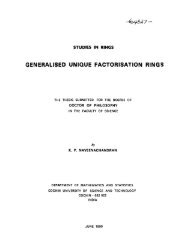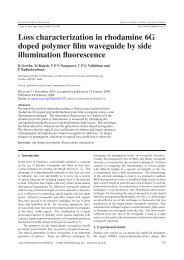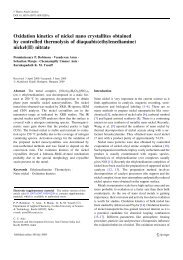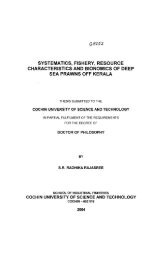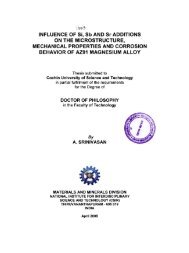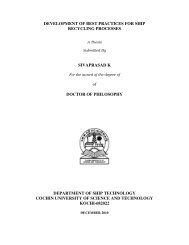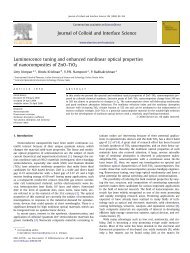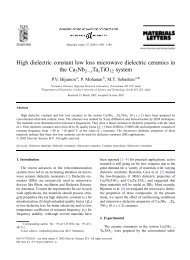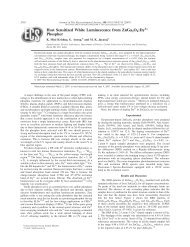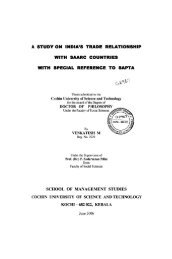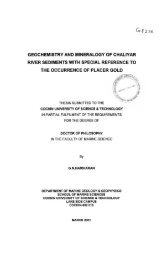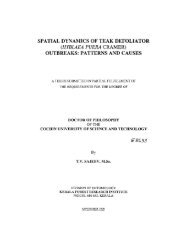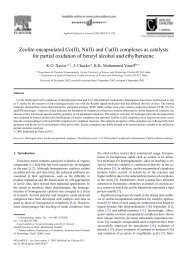- Page 2:
MUSCARINIC M1, M3, NICOTINIC, GABAA
- Page 5 and 6:
ACKNOWLEDGEMENT To the Almighty God
- Page 7 and 8:
Seema Chandran, Ms. Neema Ani Manga
- Page 9 and 10:
ABBREVIATIONS 5-HIAA 5 Hydroxy indo
- Page 11 and 12:
PFC Prefrontal cortex PLC Phospholi
- Page 13 and 14:
GABAC Receptors 34 Glutamic Acid De
- Page 15 and 16:
Behavioural response of control and
- Page 17 and 18:
the cerebral cortex of control and
- Page 19 and 20:
Muscarinic M1 receptor analysis Sca
- Page 21 and 22:
REAL TIME-PCR ANALYSIS 81 Real Time
- Page 23 and 24:
Real Time PCR analysis of GABAAα1
- Page 25 and 26:
pancreas of control and experimenta
- Page 27 and 28:
utilization is decreased in the bra
- Page 29 and 30:
impairment, coma or seizure (Cryer,
- Page 31 and 32:
achieving optimal blood sugar contr
- Page 33 and 34:
OBJECTIVES OF THE PRESENT STUDY 1.
- Page 35 and 36:
Literature Review Diabetes mellitus
- Page 37 and 38:
12 Literature Review from the adren
- Page 39 and 40:
14 Literature Review Hypoglycemic c
- Page 41 and 42:
16 Literature Review respectively)
- Page 43 and 44:
18 Literature Review in extracellul
- Page 45 and 46:
20 Literature Review substrates in
- Page 47 and 48:
22 Literature Review nucleus, altho
- Page 49 and 50:
24 Literature Review al., 1990; Lev
- Page 51 and 52:
26 Literature Review muscarinic M2
- Page 53 and 54:
Signal transduction by muscarinic a
- Page 55 and 56:
30 Literature Review nicotinic acet
- Page 57 and 58:
GABAA Receptors 32 Literature Revie
- Page 59 and 60:
34 Literature Review GABAB-mediated
- Page 61 and 62:
36 Literature Review (Erlander et a
- Page 63 and 64:
38 Literature Review which could be
- Page 65 and 66:
40 Literature Review administration
- Page 67 and 68:
42 Literature Review the hippocampu
- Page 69 and 70:
44 Literature Review understanding
- Page 71 and 72:
Confocal Dyes Rat primary antibody
- Page 73 and 74:
antipyryl)-p-benzo quinoneimine. Th
- Page 75 and 76: was analyzed. Data was expressed as
- Page 77 and 78: ANALYSIS OF THE RECEPTOR BINDING DA
- Page 79 and 80: Taqman probes of muscarinic M1, M3,
- Page 81 and 82: Taylor, 1968). The islets were isol
- Page 83 and 84: Results BODY WEIGHT AND BLOOD GLUCO
- Page 85 and 86: 60 Results IIH and C + IIH rats sho
- Page 87 and 88: Real Time-PCR analysis of muscarini
- Page 89 and 90: Real Time PCR analysis of SOD 64 Re
- Page 91 and 92: 66 Results GABAAα1 receptor antibo
- Page 93 and 94: 68 Results compared to diabetic gro
- Page 95 and 96: 70 Results compared to diabetic rat
- Page 97 and 98: 72 Results Muscarinic M3 receptor a
- Page 99 and 100: Muscarinic M3 receptor analysis 74
- Page 101 and 102: 76 Results group, α7 nAChR mRNA si
- Page 103 and 104: 78 Results diabetic rats. In C + II
- Page 105 and 106: Muscarinic M1 receptor analysis 80
- Page 107 and 108: Real Time-PCR analysis of α7 nAChR
- Page 109 and 110: Real Time PCR analysis of phospholi
- Page 111 and 112: HIPPOCAMPUS Total muscarinic recept
- Page 113 and 114: 88 Results IIH and C + IIH group sh
- Page 115 and 116: 90 Results group, GLUT3 mRNA signif
- Page 117 and 118: 92 Results α7 nACh receptor antibo
- Page 119 and 120: GABA receptor analysis 94 Results S
- Page 121 and 122: 96 Results control. D + IIH and C +
- Page 123 and 124: Discussion Glucose is the principal
- Page 125: 100 Discussion The ability to sense
- Page 129 and 130: 104 Discussion CHOLINERGIC ENZYME A
- Page 131 and 132: 106 Discussion Pancreas Insulin sec
- Page 133 and 134: 108 Discussion 2003). Cholinergic m
- Page 135 and 136: 110 Discussion brain for learning,
- Page 137 and 138: 112 Discussion hypoglycemia on brai
- Page 139 and 140: 114 Discussion shows impaired expre
- Page 141 and 142: 116 Discussion glycemic control is
- Page 143 and 144: 118 Discussion release (Ilcol et al
- Page 145 and 146: 120 Discussion al., 1992), it has t
- Page 147 and 148: 122 Discussion metabolic cycles are
- Page 149 and 150: 124 Discussion al., 1988). Low bloo
- Page 151 and 152: 126 Discussion modulate the second
- Page 153 and 154: 128 Discussion between excitation a
- Page 155 and 156: 130 Discussion hypoglycemic seizure
- Page 157 and 158: 132 Discussion Insulin secretion fr
- Page 159 and 160: 134 Discussion hyper and hypoglycem
- Page 161 and 162: 136 Discussion receptors in glucose
- Page 163 and 164: 138 Discussion exacerbated by recur
- Page 165 and 166: 140 Discussion Haces et al., 2010).
- Page 167 and 168: 142 Discussion hypoglycemic and dia
- Page 169 and 170: 144 Discussion transcription factor
- Page 171 and 172: Summary 1. Insulin induced hypoglyc
- Page 173 and 174: 148 Summary specific antibodies con
- Page 175 and 176: 150 Summary 16. Transcription facto
- Page 177 and 178:
References Abdelmalik PA, Shannon P
- Page 179 and 180:
Akwa Y, Ladurelle N, Covey F, Bauli
- Page 181 and 182:
Arison RN, Ciaccio EI, Glitzer MS,
- Page 183 and 184:
Balters E, Francesco M. (2002). New
- Page 185 and 186:
Bettler B, Kaupmann K, Mosbacher J,
- Page 187 and 188:
Boess FG, De Vry J, Erb C, Flessner
- Page 189 and 190:
Brezenoff HE, Xiao YF. (1986). Acet
- Page 191 and 192:
Caulfield MP, Birdsall NJM. (1998).
- Page 193 and 194:
Cherubini E, Martina M, Sciancalepo
- Page 195 and 196:
Cryer PE. (2002b). The pathophysiol
- Page 197 and 198:
Delgado Esteban M, Almeida A, Bolan
- Page 199 and 200:
Dutar P, Nicoll RA. (1989). Pharmac
- Page 201 and 202:
Exton JH, Jefferson LS, Butcher RW,
- Page 203 and 204:
Frier B. (2000). Hypoglycaemia—cl
- Page 205 and 206:
Gerich JE, Schneider V, Dippe SE, L
- Page 207 and 208:
Golding DW, Pow DV. (1990). Neurose
- Page 209 and 210:
Haddad GG, Jiang C. (1993). Mechani
- Page 211 and 212:
Havel PnJ, Dunning BnE, Verchere Cn
- Page 213 and 214:
Hsu KS, Huang CC, Gean PW. (1995).
- Page 215 and 216:
Johnson E, Deckwerth T. (1993). Mol
- Page 217 and 218:
Kanjhan R, Housley GD, Burton LD, C
- Page 219 and 220:
Kelley GG, Zawalich KC, Zawalich WS
- Page 221 and 222:
Krnjevic K. (1993). Central choline
- Page 223 and 224:
Lackovic Z, Salkovic M, Kuci Z, Rel
- Page 225 and 226:
Lipton P. (1999). Ischemic cell dea
- Page 227 and 228:
Mares P, Kubova H, Zouhar A, Folber
- Page 229 and 230:
McCulloch DK, Raghu PK, Koerker DJ,
- Page 231 and 232:
Miyakawa T, Yamada M, Duttaroy A, W
- Page 233 and 234:
Nusser Z, Sieghart W, Somogyi P. (1
- Page 235 and 236:
Paramo B, Hernández-Fonseca K, Est
- Page 237 and 238:
Peeyush KT, Savitha B, Sherin A, An
- Page 239 and 240:
Quan L, Meili G, Chang BS, Lowenste
- Page 241 and 242:
Robinson R, Krishnakumar A, Paulose
- Page 243 and 244:
Salkovic M, Lackovic Z. (1992). Bra
- Page 245 and 246:
Scheucher A. Alvarez AL, Torres N,
- Page 247 and 248:
(2002). Sulfonylurea receptor type
- Page 249 and 250:
Steriade M. (1996). Arousal: revisi
- Page 251 and 252:
Takayama C, Inoue Y. (2003). Normal
- Page 253 and 254:
Unger J, McNeill TH, Moxley RT 3rd,
- Page 255 and 256:
pentabromodiphenyl ether (PBDE 99).
- Page 257 and 258:
Weiner DM, Levey AI, Brann MR. (199
- Page 259 and 260:
Wredling R, Levander S, Adamson U,
- Page 261 and 262:
Zhao W, Chen H, Xu H, Moore E, Meir
- Page 263 and 264:
6. Anju T R, Pretty Mary Abraham, S
- Page 265 and 266:
Body weight (gm) 300 250 200 150 10
- Page 267 and 268:
Figure-3 Blood glucose levels at di
- Page 269 and 270:
Figure-5 Behavioural response of co
- Page 271 and 272:
Figure-7 Scatchard analysis of [ 3
- Page 273 and 274:
Figure-9 Scatchard analysis of [ 3
- Page 275 and 276:
Figure-11 Real Time PCR amplificati
- Page 277 and 278:
Figure-13 Real Time PCR amplificati
- Page 279 and 280:
Figure-15 Real Time PCR amplificati
- Page 281 and 282:
Figure-17 Real Time PCR amplificati
- Page 283 and 284:
Figure-19 Real Time PCR amplificati
- Page 285 and 286:
Figure-21 Real Time PCR amplificati
- Page 287 and 288:
Figure-23 Real Time PCR amplificati
- Page 289 and 290:
C D + IIH Figure--25 Muscarinic M1
- Page 291 and 292:
Figure--27 α 7 nACh receptor expre
- Page 293 and 294:
Figure-29 Scatchard analysis of [ 3
- Page 295 and 296:
Figure-31 Scatchard analysis of [ 3
- Page 297 and 298:
Figure-33 Real Time PCR amplificati
- Page 299 and 300:
Figure-35 Real Time PCR amplificati
- Page 301 and 302:
Figure-37 Real Time PCR amplificati
- Page 303 and 304:
Figure-39 Real Time PCR amplificati
- Page 305 and 306:
Figure-41 Real Time PCR amplificati
- Page 307 and 308:
Figure-43 Real Time PCR amplificati
- Page 309 and 310:
Figure-45 Real Time PCR amplificati
- Page 311 and 312:
Figure--47 Muscarinic M1 receptor e
- Page 313 and 314:
Figure--49 α7 nicotinic acetylchol
- Page 315 and 316:
Figure-51 Scatchard analysis of [ 3
- Page 317 and 318:
Figure-53 Scatchard analysis of [ 3
- Page 319 and 320:
Figure-55 Real Time PCR amplificati
- Page 321 and 322:
Figure-57 Real Time PCR amplificati
- Page 323 and 324:
Figure-59 Real Time PCR amplificati
- Page 325 and 326:
Figure-61 Real Time PCR amplificati
- Page 327 and 328:
Figure-63 Real Time PCR amplificati
- Page 329 and 330:
Figure-65 Real Time PCR amplificati
- Page 331 and 332:
Figure-67 Real Time PCR amplificati
- Page 333 and 334:
Figure--69 Muscarinic M1 receptor e
- Page 335 and 336:
Figure--71 α7 nicotinic acetylchol
- Page 337 and 338:
Figure-73 Scatchard analysis of [ 3
- Page 339 and 340:
Figure-75 Scatchard analysis of [ 3
- Page 341 and 342:
Figure-77 Real Time PCR amplificati
- Page 343 and 344:
Figure-79 Real Time PCR amplificati
- Page 345 and 346:
Figure-81 Real Time PCR amplificati
- Page 347 and 348:
Figure-83 Real Time PCR amplificati
- Page 349 and 350:
Figure-85 Real Time PCR amplificati
- Page 351 and 352:
Figure-87 Real Time PCR amplificati
- Page 353 and 354:
Figure-89 Real Time PCR amplificati
- Page 355 and 356:
Figure--91 Muscarinic M3 receptor e
- Page 357 and 358:
C Figure--93 GABAAα1 receptor expr
- Page 359 and 360:
Figure-95 Scatchard analysis of [ 3
- Page 361 and 362:
Figure-97 Scatchard analysis of [ 3
- Page 363 and 364:
Figure-99 Real Time PCR amplificati
- Page 365 and 366:
Figure-101 Real Time PCR amplificat
- Page 367 and 368:
Figure-103 Real Time PCR amplificat
- Page 369 and 370:
Figure-105 Real Time PCR amplificat
- Page 371 and 372:
Figure-107 Real Time PCR amplificat
- Page 373 and 374:
Figure-109 Real Time PCR amplificat
- Page 375 and 376:
Figure-111 Real Time PCR amplificat
- Page 377 and 378:
Figure—113 Muscarinic M3 receptor
- Page 379 and 380:
Figure--115 GABAAα1 receptor expre
- Page 381 and 382:
Figure-117 Scatchard analysis of [
- Page 383 and 384:
Figure-119 Scatchard analysis of [
- Page 385 and 386:
Figure-121 Real Time PCR amplificat
- Page 387 and 388:
Figure-123 Real Time PCR amplificat
- Page 389 and 390:
Figure-125 Real Time PCR amplificat
- Page 391 and 392:
Figure-127 Real Time PCR amplificat
- Page 393 and 394:
Figure-129 Real Time PCR amplificat
- Page 395 and 396:
Figure-131 Muscarinic M1 receptor e
- Page 397:
C D + IIH Figure-133 GABAAα1 recep



